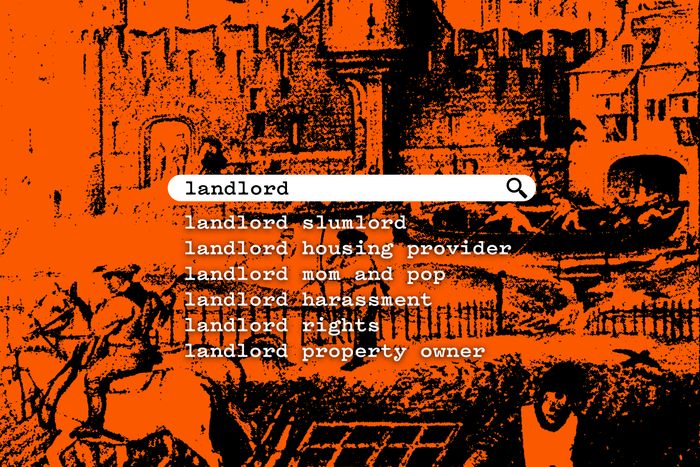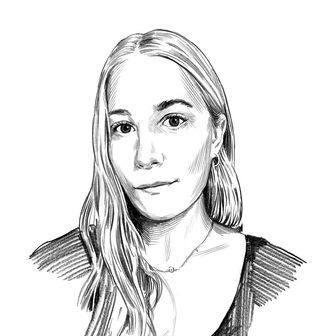
Last month, the real-estate reporter Rebecca Baird-Remba was writing an anodyne story about a commercial lease when an automated suggestion popped up in Google Docs. “Inclusive warning,” it read. “Some of these words may not be inclusive to all readers.” The word was landlord. Google suggested she instead try property owner or proprietor.
Baird-Remba tweeted out a screenshot, prompting dozens of gags about landlords as a protected class. (People jokingly proposed Landlxrd and landed-American, though the Google AI was likely flagging landlord as a gendered term.) But at least one guy, a rental-housing economist in Dallas named Jay Parsons, responded in earnest. He would “love to see @AP finally remove ‘landlord’ term from its style guide,” he wrote, because it is a “silly term dating to middle ages.” Taking landlord out of The Associated Press Stylebook seems to be something of a pet cause: “Look around at rental industry groups and individual property manager websites,” he wrote in November, and “no one uses ‘landlord’ term anywhere.”
Except that everyone does, pretty much everywhere. Interest groups, trade associations, and the government all still use the word landlord. Our New York state attorney general uses it, and our city’s Department of Social Services uses it. There’s even a social-networking platform here, the “first social network exclusively for landlords and property managers,” called LandlordsNY. Its Twitter account recently posted that “landlord voices must be heard!”
Still, our concerned real-estate economist isn’t entirely alone in his desire to reform the language around property ownership. On the landlord forum Bigger Pockets, someone named Susan says she was “looking for some fresh and innovative ideas to replace the term ‘Landlord.’” Responses were not all helpful: “Given the fact that you are from ultra liberal Oregon,” another user responded, “your question doesn’t surprise me one bit.” (The user went on to advise Susan to get over it: “Go work on your next rental deal instead. Will serve you a lot better. BTW - My tenants just call me an a$$hole. I love it. LOL.”) A person on ReinvestorTimes.com thinks the term should be landholder. “I cringe when I hear it, and when I say it, but it’s really a struggle to find a word that describes the owner-operator of a handful of rental properties,” they say. Although landlord is still alive and well, a niche inside the industry seems to be emerging: the landlord with a complex about being called a landlord.
Last year, the writer Adam Johnson noticed a local Chicago news article that repeatedly used housing provider instead, as well as a Columbus Dispatch op-ed claiming the term landlord “helps paint housing providers as villains.” Pandemic eviction moratoriums prompted a cycle of these kinds of opinion pieces, many of which featured headlines with some version of the catchphrase “Landlords are people too.” (In Pittsburgh, you can attend a “Landlords Are People Too Active Happy Hour,” and in Michigan you can buy a “Landlords Are People Too” T-shirt.)
A company called FBS Property Management in San Diego devotes an entire section of its website to encouraging owners to use housing provider: “We do not view ourselves as landlords,” the page reads. “It is such a harsh term to describe what we do. We are housing providers. Landlords are those who refuse to take care of the property or do not follow Fair Housing Laws. Housing providers are people who adhere to high ethics and best practices.” It’s an attempt to recast an economic transaction as a social service, much as human-resources managers became “chief people officers.”
Lucinda Lilley, the vice president of FBS, told me the decision to publish the guide last year came after a particularly heated county board of supervisors meeting about extending San Diego’s eviction moratorium. “Housing providers have been under attack,” she says. At the meeting, she explains, “the calls from the renters’-rights groups and the horrible things they said about anybody who owns rental property actually hurt me to my core … ‘Landlords are awful. Landlords are just capitalists.’ We spend our time helping people and providing homes for people to live in.” Thus, housing provider.
Landlord language has always been slippery and replete with doublespeak to soften the harsh reality of for-profit housing. Self-help eviction, a bizarre euphemism for an illegal one (as if landlords breaking the law were merely helping themselves out), is one example. Mom-and-pop has often been affixed to landlord to describe people who rent a single room in their home but also those who own as many as ten buildings. The semantic debate over their very job title speaks to the apparent discomfort some landlords are feeling about their business model — housing as a commodity. It doesn’t sound nice to be in control of whether another person can have shelter, especially when that shelter becomes crucial to surviving a pandemic. Eviction moratoriums, local and federal, combined with ever-increasing housing scarcity, rising market rents, and the impossibility of homeownership, have pushed an already tense, awkward relationship into newly contentious waters. One owner of eight rental properties in North Carolina posted a blog about her hatred of both landlord and tenant because, in her words, “I don’t believe that there is a hierarchy in the relationship between me, the homeowner, and our clients who choose to rent our homes,” she wrote. Except that the hierarchy is very real, and very clear. As Oksana Mironova, housing policy analyst at Community Service Society of New York, puts it, “A conversation about power is instead becoming a conversation about who is being mean to someone else.”
Despite their feelings of persecution, it’s a pretty good time to be a landlord. New York’s “Good Cause” eviction law is likely dead for this legislative session. Bidding wars have left tenants raising their own rents just to secure a place. For market landlords, “rental-price gains accelerated to reach new records” in Brooklyn, Manhattan, and Queens, per a recent Douglas Elliman report. And owners of rent-stabilized units were recently granted their biggest rent hike in ten years by the city’s board, though they have complained that it isn’t enough. On the other side, renters — most of the people who live in New York City — are handing over 30 percent of their incomes to their “housing provider,” month after month. Of course, not every landlord is hung up on what to be called. Dustin Heiner, who offers coaching to other real-estate investors through his website and podcast, Master Passive Income, said he doesn’t care. “If somebody doesn’t like the word landlord or they’re using the word landlord in a negative way, it’s probably true,” he told me. “The landlord is probably bad.”





